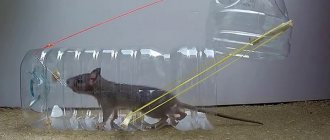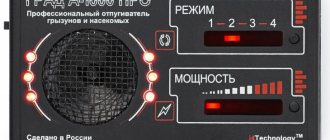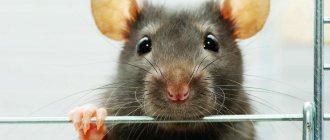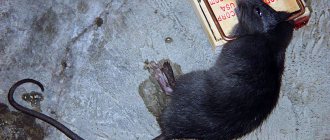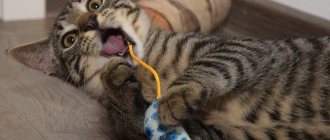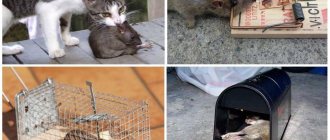Rats often prefer to live in human housing, where there is warmth and enough food. Over the course of a year, one adult animal can eat up to 10 kg of food, and chew and spoil much more.
The pests' strong teeth easily cope with electrical wires, plastic, wood and even concrete.
In addition, rodents carry infections that are dangerous to the human body. A variety of methods are used to control rats. One of them is bait, which helps catch animals.
Types of bait
Baits produced for rats and mice are divided into the following types:
grain mixtures; granular baits; soft briquettes; hard baits in briquettes; rodenticide foam.
In addition, gels are also produced, very similar to bait in briquettes, and powders, but inconvenient for use at home.
Anticoagulants are added to baits for mice and rats, which block blood clotting. As a result, after 3–7 days the death of the animal occurs. The delayed effect of the drug on the rodent body provides significant effectiveness:
they cannot determine the danger of what they eat and warn their brothers; There is no rejection, thus ensuring trouble-free effect.
The main thing for bait is to be tempting to the rodent, so manufacturers pay a lot of attention to the aroma and taste of the food. For this purpose, special substances are used that excite animal receptors. Flavors with the smell of chocolate, cheese and cream with vanilla are often added to the bait. In addition, the food is reliably protected from mold, it is stored for a long time without loss of quality and retains its good appearance.
Features of grain mixtures
Grain is the most common food for mice and rats. It is made using wheat or oats, and mixtures of grain crops are also possible. Highly effective, poisoned grain can cause death in a rodent if it eats the poison within one day.
Grain baits are also good because rats and mice drag grains into their holes, storing them for food. And there pregnant females and young shoots feed on these supplies, which leads to mass death of pests. Grain baits for rats and mice are used outdoors and indoors. They are laid out in small portions near water and in places where they are often present. In rooms with pets, it is better to use poison in bait houses.
Prevention
For preventive purposes, pests are deprived of food and water. To do this, it is recommended to promptly dispose of food waste and promptly eliminate the appearance of water in basements. Due to lack of nutrition and thirst, pests move to other places. In warehouses, cracks that appear are covered with a cement mixture with broken glass, concrete floors are made, and thick metal bars are installed on the windows.
Granular baits
Pellet baits work on the same principle as grain baits. The difference is that they are prepared from a special mixture containing grains, flour and sweets that rodents love, and then formed into granules. They are easy to eat and carry by rodents. They are used indoors and outdoors.
They do not crumble, do not get wet in water, do not succumb to mold, and remain attractive to pests for a long time. It is very important that granule baits are several times more effective than grain baits and more economical to use.
Lures in soft briquettes
Soft briquettes are a favorite treat and one of the best baits for rats. Rodents like doughy food, which they prefer to grains and eat it mostly entirely, and as a result their population is significantly reduced.
Soft baits also work well against mice. Within 4–6 days of use, rats are completely destroyed, and mice are destroyed by 90%. The briquettes contain the optimal dosage and are packaged in edible paper. They are easy to use, placed in certain places, and easy to monitor when eaten. The poison contains a bitter component that repels domestic animals.
Diet composition
So, in any diet there is a basis, namely, the food that makes up the majority of the daily menu. In this case, the basis is a grain mixture, but of high quality.
The best option would be to purchase a ready-made mixture rather than making it yourself, since manufacturers take into account the needs of the animal and make it in the correct proportions. There are no food restrictions; an adult rodent eats about 30 grams daily.
Vegetables, herbs and fruits must be present in the daily menu. The introduction of protein complementary foods is mandatory. It is especially important for young, growing organisms, as well as for females during pregnancy and nursing.
We must not forget about treats to occasionally pamper your pets, and they are also given as encouragement during training. Nuts, popcorn (unsweetened), seeds, and banana chips can be used as treats. Remember that treats are given very rarely, so as not to harm your health.
When composing the animal’s diet, you need to adhere to the following feeding standards:
- Feed mixtures – 60%.
- Vegetables, herbs, fruits (unsweetened) – 20%.
- Protein food (eggs, meat) – 10%.
- Fermented milk products – 5%.
- Treats – 5%.
Next, we will take a closer look at each section of nutrition and learn the features of feeding.
Rodenticidal foam
Rodent poison foam is contained in a pressurized container. When leaving it, it acquires a dense mass that does not lose its shape for a long time. This new type of bait has a double effect. It itself is poisonous, and when used, it fills all the cracks where rodents live. Having smeared themselves in it, the rats eat the toxic substance when cleaning their skins.
The poison is convenient because it can be used to coat pipes and walls, and when used, a person does not come into contact with it. The foam is applied directly into holes or onto substrates. It retains its shape for a long time and is readily eaten by rodents. Which bait is best to purchase largely depends on the place of application and the choice of the buyer.
Rating of the best rodent poisons
There are many different rodent poisons on the shelves of retail chains. What bait is best for rats? Here is the rating:
“Rat Death No. 1” - developed by a Ukrainian company. It is considered an effective and efficient long-lasting remedy. The product is highly toxic, so when using, you should strictly follow the instructions. The poison disrupts blood clotting, but in the first two days the animals do not experience discomfort and bring their relatives to enjoy the delicacies. The peak effect occurs on the seventh day. “Efa” – produced in the form of soft briquettes. The poison takes effect on the third day. Briquettes are convenient to lay out and control. The product does not release toxic substances for a long time, therefore it is recommended for use for preventive purposes. “Storm” is highly toxic and comes in the form of small granules with jagged edges that encourage the rodent to sharpen its teeth. The product is resistant to moisture and mold. Animals die on the sixth day. “Zookoumarin Neo” - consists of poisoned grains of bright color. The death of rodents occurs 3 hours after poisoning. Goliath is a new rat bait that is gaining popularity. Its uniqueness lies in the drying of corpses, which are subsequently burned. The effect occurs after 12 days. The poison is very toxic and is used only by professionals.
When choosing poison against rodents, you need to remember: the best of them acts slowly but effectively. When using, it is important to follow the instructions and destroy poisoned corpses in a timely manner.
Rat catching devices
Man is constantly improving methods of fighting rodents, and in addition to poisons, many different devices have been invented to catch the animal. All of them are divided into two types:
when caught, the rodent dies; the pest remains alive, but isolated.
Rat traps for the most part have a trap method of operation, which consists of triggering a spring device and tightly squeezing the animal between two plates or an arc and the base of the mechanism. The upper part of the structure is always metal, and the lower part is plastic, wood or metal. The device is used in residential and non-residential premises.
Types of rat traps
There are various factory designs for catching rats and mice on sale, and they are also made by craftsmen. Here are some of them:
Mechanical rat traps are convenient and simply designed devices. During the night, depending on the device, up to 10 individuals are caught. Traps are reliable, but not very convenient. Homemade devices - there are a large number of different designs. Electronic is the most effective and convenient method of catching rodents.
Let's sum it up
As you can see, organizing a proper and healthy diet for a rat is not so difficult, the main thing is to be careful and follow the recommendations. It’s a completely different matter when owners want to pamper their pets, give them something tasty, thinking that they are benefiting the animal, but actually harming their health.
If you give a rat a choice in food, namely putting a variety of food in the cage, you can be sure that they will choose only the most delicious, and not the healthiest. Therefore, it is the owner who must organize and properly balance the menu, without relying on the taste preferences of the rodent.
Proper nutrition is very important for them, since it is what determines the health and long life of the animal. Monitor the rat’s condition, activity, good mood, appetite, appearance, habits; if changes are noticed, go to the veterinarian, who will give the right recommendations.
What properties should the bait have?
When selecting bait for a mechanical rat trap, the following characteristics must be taken into account:
Smell. The rat should be attracted to the scent that is familiar to it, so that it consciously looks for the source of the treat, and does not end up there by accident. Type of treat. For bait, use only a product familiar to the animal. If it is left untouched for 2-3 days, then it is not suitable for a rat and requires replacement. Consistency. To trigger the trap's mechanical lock, the rat bait in the trap must be tightly constructed so that pulling on the bait will cause it to snap shut. When using bait with poison, its smell must be overwhelmed by the aroma of the food base. Size. Take bait of sufficient size so that it does not make the rat wary. Bait is usually prepared yourself using foods that rats like. But it is quite reasonable to use store-bought ones; they are sold in a large assortment.
Nuts
Mice love nuts no less than seeds. They gnaw through the thick shell on their own. But shelled nuts will attract attention faster.
For bait you can use:
- walnut kernel;
- peanut;
- peeled hazelnuts.
Naturally, nuts should be without spices. Those sold with beer, with various flavoring additives, will not be suitable.
Bait Products
Rats are omnivores and consume everything that is available in landfills. But they also have favorite foods, which they rush to, falling straight into a trap with bait. What do rats like:
Salo. Fresh pieces of smoked or salted product are used as bait for rats in a rat trap. Sausages. Having a good sense of smell, rats are able to distinguish additives in products and do not want to feast on cheap types of sausages. They like expensive smoked varieties. Vegetable oil. They soak bread and sometimes a cotton swab with it. Rodents love the smell of dark, unrefined sunflower, sesame or peanut oil. Grain and bread products. This is a favorite food of mice, but rats can also feast on such foods. Cheese. Fermented milk products are sometimes mistrusted by animals, but cheese is quite suitable as bait for rats.
All of these products are suitable for traps that have a mechanical interlock.
DIY traps
If you start fighting rats before they begin to multiply at a huge rate, then there is a chance that you will only need a trap once or twice. The prices of traps for rats range from 300 to 3000 rubles. Agree, this is a rather expensive gift for a rodent that you want to get rid of. Therefore, it is worth thinking about how to make a rodent trap with your own hands.
General recommendations for catching rats:
- Bait. If you want to interest and lure this intelligent animal into a trap, you need to choose the right bait. Firstly, it must be fresh food - the prevailing opinion that rats love garbage dumps is somewhat incorrect. Rats love tasty and fresh food much more than garbage assortment. Therefore, fresh cheese, lard, porridge with butter, sausage and similar products are suitable. A rat is unlikely to get caught on vegetables, fruits and bread.
- Hygiene. If the trap or trap is designed for repeated use and has already been used, the device must be washed and cleaned most thoroughly. The rat's sensitive nose will detect the smell of blood or excrement of its predecessor, this will force it to avoid the trap. It is not advisable to use special products for cleaning - a strong perfume composition will again scare away the rodent. The ideal option is a solution of ash liquor - the ash is mixed with water, and the resulting mixture washes off all contaminants. But since it can be difficult to find this in urban areas, you can get by with soda.
- Location. If you know where the rat holes are located, the task becomes easier. The trap should be placed next to the exit along the wall, in a place where little light reaches.
From simple to complex
Simple options are sometimes the most effective. In order to rid your country house or barn of rodents, you can try using a bottle trap. To do this you will need:
- sunflower or any other vegetable oil;
- bait;
- large bottle;
- knife or scissors;
- tape or wire.
Some traps are a little difficult to make, but the result is worth the time invested.
Insert the cut part into the bottle with the neck facing inward. Secure both parts together. The trap is ready. The animal will be able to get inside, but will not be able to get out because of the slippery walls. This is the simplest and most budget-friendly option for a rat trap. It is not suitable for large rodents.
A water trap is a large bucket filled one third full of liquid. The walls of the bucket should be oiled so that the animal cannot escape. A “path” with bait should be connected to the center of the bucket from the edge, installed in such a way that under the weight of the animal it falls into the bucket. The rat will not be able to get out of the bucket and will drown.
A rat trap is a live trap that does not kill a rodent, but simply catches it
A mechanical rat trap is made using a simple design, but the effectiveness of such a device is high. In addition, this design is suitable for large specimens and can simultaneously capture not one, but two or even three medium-sized rodents.
A rat trap is a box whose roof is not flat, but sloping. A bait is attached to the inside of the roof. Two windows are cut in the opposite walls of the trap, between which a bridge is attached, consisting of two parts on hinges. Its design should be such that in a calm state it is horizontal, but when the rat approaches the bait along it, the bridge “dives” down, overturning the animal, and returns to its original position. The rat will no longer be able to get out, since the hole is blocked by the same bridge.
This is interesting: how to catch a rat.
DIY electric rat trap
To make such a trap, you will need to remember the school physics course, especially the “Electricity” section. The floor of the trap is usually made of wood, and in one place a small depression a few centimeters wide is made, and bare wires are passed through the floor. On top there is a piece of tin, which is set in motion under the weight of the animal. The bait is placed in a key place: when the rat gets to it, the plate goes down and closes the contacts. The rodent dies on the spot due to electric shock.
Some recommend making such traps covered, with transparent plexiglass walls. Some people combine mechanical rat traps with electric ones for reliability.


